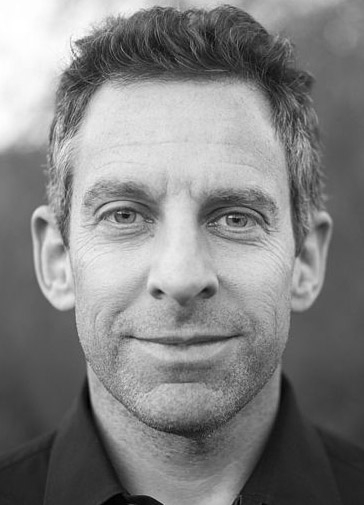On this date in 1967, author and neuroscientist Samuel Benjamin Harris, a key figure in the 21st century freethought movement, was born in Los Angeles, the son of TV producer and writer Susan (Spivak) Harris and actor Berkeley Harris, who divorced when Sam was 2. He grew up in his mother’s secular household and enrolled at Stanford University to study philosophy but left during his sophomore year to study Eastern religions and meditation in India. He eventually returned to Stanford and graduated in 2000.
He started writing his first book, The End of Faith, after the Sept. 11 attacks in 2001. It received the PEN/Martha Albrand Award for First Nonfiction in 2005 and was followed by his Letter to a Christian Nation in 2006. Harris married in 2004 and has two daughters with his wife Annaka, an author and science editor. They co-founded the nonprofit Project Reason in 2007. He received a Ph.D. in cognitive neuroscience in 2009 from UCLA. Five of his books are New York Times bestsellers. His latest, as of this writing, are Waking Up: A Guide to Spirituality Without Religion (2014) and Islam and the Future of Tolerance (with British activist Maajid Nawaz, 2015).
Harris is generally considered a member of the “Four Horsemen of New Atheism” along with Richard Dawkins and the late Daniel Dennett and Christopher Hitchens. The name comes from the title of a video they made during a two-hour unmoderated discussion at Hitchens’ home on Sept. 30, 2007. Journalist Simon Hooper described New Atheism as “the view that superstition, religion and irrationalism should not simply be tolerated but should be countered, criticized and exposed by rational argument wherever its influence arises in government, education and politics.”
Harris has no use for the term New Atheism or for the atheist label. In a 2007 speech he said that while he had become “one of the public voices of atheism, I never thought of myself as an atheist before being inducted to speak as one. I didn’t even use the term in The End of Faith, which remains my most substantial criticism of religion. And, as I argued briefly in Letter to a Christian Nation, I think that ‘atheist’ is a term that we do not need, in the same way that we don’t need a word for someone who rejects astrology. We simply do not call people ‘non-astrologers.’ All we need are words like ‘reason’ and ‘evidence’ and ‘common sense’ and ‘bullshit’ to put astrologers in their place, and so it could be with religion.”
PHOTO: By Christopher Michel under CC 4.0.


